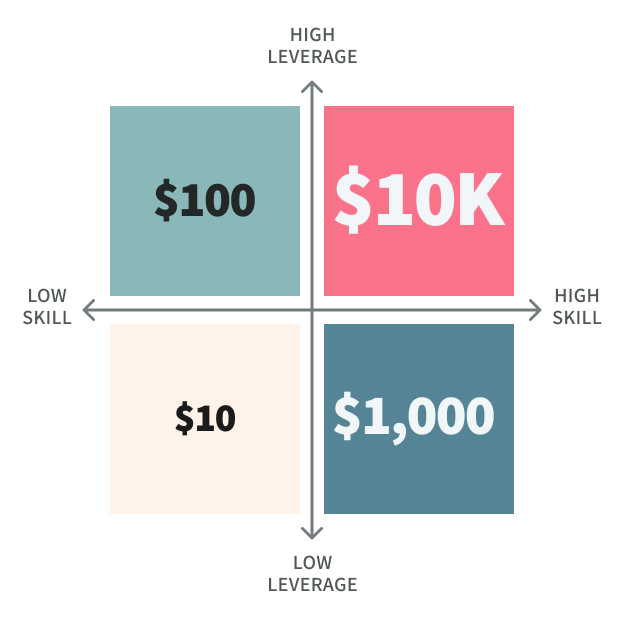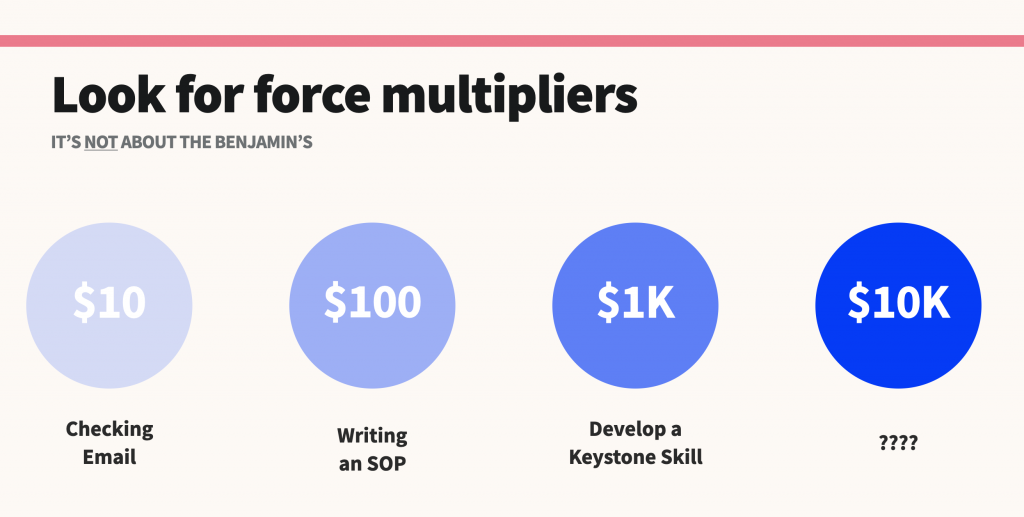My cofounder, Long, sent me a YouTube clip of Cal Newport talking about Slow Productivity with Prof G, and said:
It makes a lot of sense that you should work fewer hours, fewer days per week. And do $1K/hr works!
In his comment, he specifically referred to the $10,000/hour work matrix, a concept we’ve previously explored.

I texted him back with a link to my recent blog post, Slow is the new fast?
Oh wow! I didn’t know you started blogging. (check a few links) That’s awesome, man! Imagine you can keep it up until your birthday!!
So it happened. This is the 14th day of continuous blogging, and I have the chance to link to something I wrote. I wonder, after 100 days of writing in public, how many posts will I get the chance to link to in my response to someone else’s text message? One? Ten? Twenty?
Before you think I sound so wise, all my posts so far are not of quality yet. In fact, I cringe when I re-read some of them. I expect that. I write them when I’m super sleepy, usually after 11 p.m., and I want to finish so I can go to bed. Today is no exception. It’s almost midnight, and I have a long bike ride in the morning. I look at my bed and my wife sleeping soundly, longingly.
I just checked. It’s 120 days until my birthday.
Earlier, Long’s reference to the 10 work. It checks off my daily TODO. I feel a sense of dopamine when I hit publish. As I write more, I am looking for ways to improve the skill of writing and the leverage of what I write. It would be unrealistic to expect to go from 1000 by writing daily. I will need deliberate practice and a few breakthroughs along the way. I need to keep seeking leverage to move from 100/hr work.
What is leverage?
As an entrepreneur, the first thing that comes to mind in terms of leverage is that the business can keep moving even when you stop working. When I write code, I work in the business. When I write to formulate my thoughts so that I can communicate more clearly, I work on the business.
One form of leverage is labor. Some people are not a fan, saying it’s the oldest and the worst form of leverage in this modern world, such as the famous Naval Ravikant in his [Almanack of Navikant - A Guide to Wealth and Happiness]. I can see why he said that, but I disagree. In Asia, we see collectives of talent. We are social animals. Managing people can be rewarding. Leadership and management skills need to be learned, trained, and built, but they can be applied outside work, including family and personal life.
Another leverage is money. With capital investment and good decisions, money multiplies.
Replication is the most interesting leverage. Before starting my current consulting business, I spent a decade working on tech products. Coding, or building software in general, is an excellent leverage. We boasted the ability to delay making profits because tech products carry a very high margin. This is why tech companies get valuations that are 10x to 1000x revenue. I am not working on a software product, but I help founders build them. I work on labor leverage to help clients build product leverage.
Writing could be a form of replication leverage. However, it will take years and decades for me to catch up. But hey, maybe one day I will spend 100 hours writing a book that 1000 people will buy at 1K work. Rinse and repeat.
As I am trying to cut down on “busy work,” I will keep exploring ways to apply Slow Productivity to help make strategic decisions. My north star is to discover $10K/hr worth of work one day.

Thank you, Khe Hy for the great framework. From a fellow Yalie with much admiration.
Next: Learning German